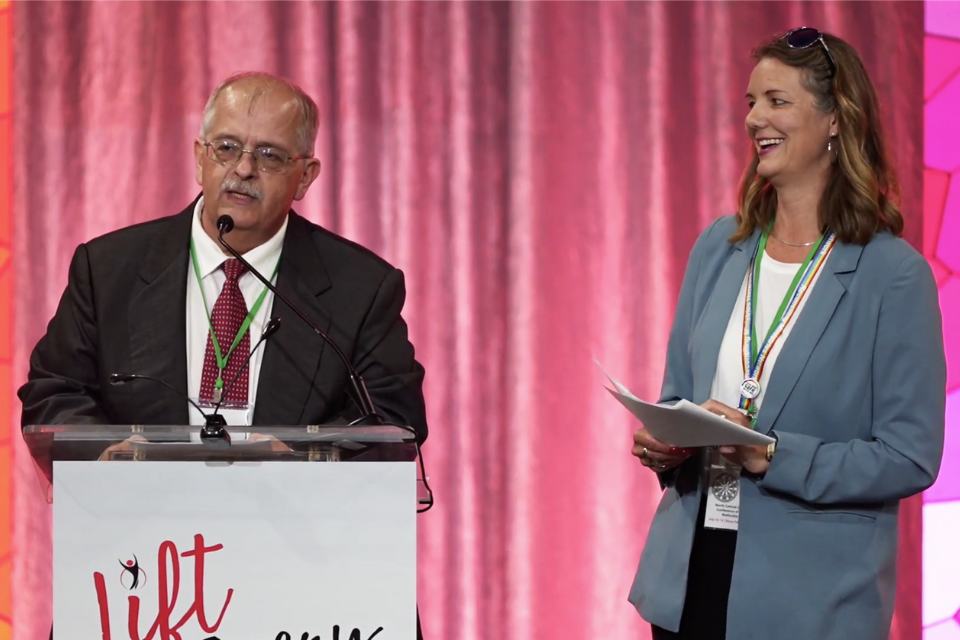The NCJ Committee on Episcopacy reported to delegates on the challenges of their work, given the need to lower the number of bishops in the NCJ and due to the financial demand for the Episcopacy Fund.
LIZ WINDERS
Director of Communications, Iowa Conference
During Wednesday’s business session at the 2024 North Central Jurisdictional (NCJ) Conference, Rev. Dr. Barrie Tritle, chair of the Committee on Episcopacy’s Executive Committee, and Beata Ferris, vice chair, reviewed the committee’s work over the last two years.
The committee consists of 20 members who represent ten annual conferences in the jurisdiction. It is responsible for several critical functions related to the management of bishops, including episcopal elections, assignments, oversight, discipline, and policies and procedures.
“Additional work this quadrennium included meetings of a ‘Functional Role of a Resident Bishop in the NCJ Task Force’ to imagine ways to make sharing episcopal leadership manageable, sustainable and fruitful,’ said Ferris. “Their report was made available for our January special Jurisdictional Conference.”
During the past two years, the committee has had a full plate because of the need to lower the number of bishops and due to the financial demand for the Episcopacy Fund. In addition, every committee member is part of an “interview team” that holds individual conversations with each bishop every year. Unanticipated questions regarding retirements, medical leaves, episcopal roles, and coverage have kept the committee busy and brought forth the spiritual gifts of its members.
A few key recommendations and updates from the committee:
-
- All of the current active and retired bishops are of sound character and should continue in their respective relationships within the NCJ.
- Bishop Gregory Vaughn Palmer (West Ohio) and Bishop Julius Trimble (Indiana) have met the requirements for retirement and should enter that status as of Aug. 21, 2024.Bishop Frank Beard (Illinois Great Rivers) has applied and been approved for long-term disability, effective August 1, 2024. Arrangements will be made for episcopal leadership within his current area for August until a new bishop is assigned and starts September 1, 2024.
- In consultation with the Interjurisdictional Committee on Episcopacy and the NCJ Jurisdictional College of Bishops, it has been determined:
- Bishop Beard will be compensated with long-term disability insurance,
- Bishop Beard will be released from regular episcopal duties, and
- Bishop Beard is not eligible for assignment.
- With the new allotment of bishops determined by General Conference earlier this year, the NCJ will have six bishops assigned to seven episcopal areas. Bishop Beard does not count toward the NCJ allotment, or the 32 total bishops allotted to all five U.S. jurisdictions, so the committee recommends that the NCJ Conference have no elections during its gathering this week.
- For episcopal areas that are being combined, the committee has worked with teams from each and recommends that the new combined West Ohio and East Ohio area be named The Ohio Conference Episcopal Area and that the new combined Northern Illinois and Wisconsin area be called The Northern Illinois-Wisconsin Episcopal Area.
- Due to the reduction of bishops, the committee will assign one bishop to serve two existing episcopal areas beginning September 1, 2024.
- The committee recommends that the jurisdiction continue with seven episcopal areas for the quadrennium, begin conversations in 2026 about the best missional arrangements for combining areas, and prepare for 2028 with a plan for potentially fewer episcopal areas.
The committee is committed to collaborating and participating in the adaptive work required in a time of immense change in The United Methodist Church.
Last Updated on July 12, 2024

